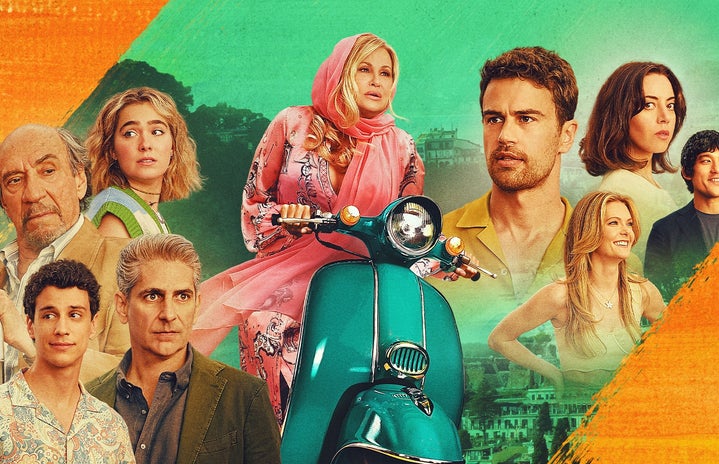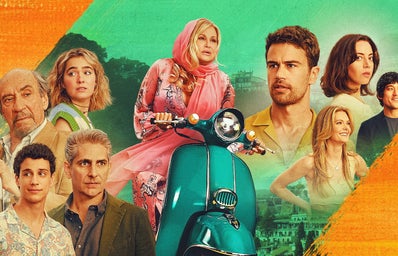*This article contains spoilers of HBO’s The White Lotus*
The White Lotus has undoubtedly been one of the most talked-about shows of 2022, and for good reason. Putting aside all the Jennifer Coolidge Peppa Pig memes fans cannot get enough of (myself included), the show created by Mike White features a legendary cast and it recently snagged the Golden Globe for Best Limited Series.
To those unfamiliar to the show’s first season, underneath all the iconic scenes, meme-fuel moments and kaleidoscopic melodies, lies a deep rooted social critique of the wealthy. While the first season deals directly with greed and themes of neo-colonialism in the hotel chain’s Hawaiian resort, the second season, set in Italy, focuses on lust, sex and betrayal. That’s not to say this season completely ignores socio-economic inequalities between wealthy tourists and disadvantaged locals; rather, it explores them from a different angle, specifically perpetuated by (you guessed it!) men.
The White Lotus S2 makes a strong point of showcasing attitudes in men, each with their own set of misogynistic and sexist attitudes, as well as their evolution throughout the season, making the show feel almost like a collective character study on toxic masculinity. On one side, the show presents the characters of Albie, Dominic and Bert, three generations of Di Grasso men seeking to connect with their Sicialian heritage. Dominic, played by Sopranos alum Michael Imperioli, is a troubled, Gen-X father with a sex addiction who seems to realize too late the damaging effects of his actions on his marriage, while Grandpa Bert, played by F. Murray Abraham, does little more than hit on women, blaming his unquenchable horniness and inappropriate behaviors on simple biology. Albie Di Grasso, played by Adam DiMarco, is much more of an enigma. Albie is funny and sweet, calling out his dad and grandpa’s sexist behavior several times. He’s sensitive, understanding and cautious with girls; steering clear from the lustful tendencies of the Di Grasso men.
But red flags are slowly raised when Albie prides himself a little too much in his knowledge on feminism, self-describing himself as a nice guy, and constantly pressuring Portia (Haley Lu Richardson) into going on family trips around town, not to mention his unwillingness (or maybe unconscious failure?) to understand Lucia’s role as a sex worker when convincing himself he was falling in love with her. If he’s a nice guy, then why aren’t girls into him? It’s precisely this incel-leaning mindset that puts him in a higher moral ground, entitling him to love and affection. Devrupa Rakshit, Associate Editor from The Swaddle, describes Albie’s character development as a classic case of white knight syndrome, a tendency to “rescue” a damsel in distress in a relationship for personal satisfaction. Towards the season’s climax, one can wonder how similar these three generations of men actually are —-maybe even more than they’re different. While Albie, Dominic and Bert’s attitudes can easily be blamed on lack of romantic experiences, compulsive behavior and living in past times, respectively, the trio are ultimately a Pokemón-like evolution of the same, constant mentality.
Another, more polarizing yet, exploration of masculinity is portrayed by loyal introvert Ethan (Will Sharpe) and obnoxious tech bro Cameron (Theo James). Both friends arrive at the White Lotus with their wives, Harper and Daphne (played by Aubrey Plaza and Meghann Fahy) for a double-date style vacation. It’s not a mystery just how annoying of a person Cameron is, as he openly brags about his wealth and his success in both business and his marriage. Cameron has it all, and with a true alpha male mentality, believes he can get away with absolutely anything: behind closed doors, he shamelessly admits to cheating on his wife and even encourages this behavior to Ethan, while flirting with (and even sexually harassing) Harper. Ethan, ever the innocent bystander of his own marriage, is faithful to his wife, and will do anything to defend this fact. Like Albie, Ethan’s another nice guy in the show, but he slowly progresses into an expert gaslighter as he waves off Harper’s suspicions and concerns on their life as a married couple —all in the name of upholding the proverbial bro code.
Cameron’s behavior pretty much stays the same throughout the season, but Ethan is eventually consumed with jealousy and distrust, until he finds no better way to solve the issues with his wife than finding Cameron and brutally beating him up. The once mild-mannered Ethan resorts to violence in the end; a fitting finale for repressed emotions characteristic of toxic masculinity. In fact, it’s Ethan’s physical assault on Cameron, a primal and violent result of feeling threatened by another male of the species, that reignites his relationship with Harper. Caught up in lies, manipulation, and the ultimate need to defend their “manliness”, Ethan and Cameron are two sides of the same coin.
As complex as these explorations on masculinity can be, the show doesn’t exactly celebrate any of these attitudes. Instead, we get to see these characters for who they really are: flawed, misogynistic men who will collectively, whether consciously or unconsciously, gaslight, exploit, use, and abuse women. Not surprisingly, we don’t actually get any confirmation that either the Di Grasso men or the dueling pair have changed their behavior, or even realized the errors of their ways. This echoes our present reality, where everything from debates to what masculinity should or shouldn’t be, to controversial statements from figures like Andrew Tate and Jordan Peterson and even all the different *yawn* male types are common topics among Gen-Z; but is today’s generation of men really progressing past these attitudes and behaviors? That’s where The White Lotus Season 2 comes in. It may not have been the show’s intention to expose the various iterations of toxic masculinity, but it certainly starts a conversation.


